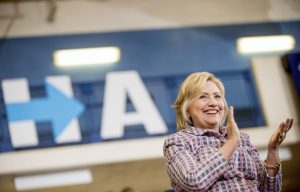
Hillary Clinton campaign representatives and supporters have held two private meetings with top Catholic and evangelical leaders in Washington to discuss the global development policies of a potential Clinton administration.
Several of Clinton’s former State Department advisors organized the meetings via their foreign policy volunteer group, “Idealists for Hillary,” which is working to activate supporters in global development networks. Cindy Huang, a former advisor for State’s Global Hunger and Food Security Initiative, helped to convene the closed-door sessions, each for about a dozen religious leaders.
Participants describe the gatherings to TIME as opportunities to share their policy priorities and organizational needs with Clinton advisers. Unlike private meetings Trump has held to raise political support among the religious right’s powerbrokers—where social conservative leaders have tried to ease their anxiety over Trump’s his positions from abortion to immigration—these meetings were listening sessions focused on the policy priorities on topics like refugees, poverty reduction and international assistance.
“The goal of both meetings has been to a) learn about the priorities of people of faith engaged in humanitarian work b) work with supportive leaders to help get them and their communities involved in our field organizing efforts in Virginia and elsewhere,” a Clinton campaign spokesperson told TIME.
The group first organized a meeting with Catholic humanitarian leaders and Clinton policy advisors on June 23. A representative from the United States Conference of Catholic Bishops attended—“we are open to meeting with both parties around development issues,” he explains—and says the event was less about politicking in the election than about including religious voices’ policy perspectives for Clinton’s transition team.
Organizers held a similar meeting for evangelical and mainline Protestant leaders in Washington on July 19, during the Republican National Convention. Helene Gayle, CEO of McKinsey Social Initiative and former president of CARE USA, served the main “listener.”
Deborah Fikes, former permanent representative to the United Nations for the World Evangelical Alliance, who has endorsed Clinton, attended. “It truly was a listening session that offered substantive discussions with our feedback from faith organizations in the Middle East, with people on the ground working in some of the most critical locations with refugees and IDPs,” Fikes says. “I was encouraged that senior advisers to Hillary Clinton really understand the importance of the world that faith groups do in all aspects of American foreign policy and value and respect our advices.”
Steve Roese, co-founder of Water is Basic in South Sudan with Bishop Elias Taban, also attended. Taban is close to Clinton—she visited him in South Sudan in 2012, and the Clinton Global Initiative awarded him a top prize in 2013. “It is very encouraging, as somebody who is deeply involved in helping the marginalized, that a campaign would take time to listen,” Roese says. “That rarely happens.”
Galen Carey, vice president of government relations for the National Association of Evangelicals, joined and raised a concern about how “new orthodoxies,” as he says, on issues like marriage and sexuality could prevent religious groups from hiring who they want or getting government grants. “Most of the humanitarian work in Africa, like schools and hospitals, were started mostly by missionaries, including a lot of evangelicals,” Carey says. “If the government tries to impose ideological constraints on civil society groups, then we could be written out of the picture, and that would be a lose-lose, certainly for our organizations, but much more importantly for the work that needs to be done.”
Chris Seiple, board chairman of the Institute for Global Engagement, a religion and foreign affairs think tank, attended in his personal capacity. Seiple currently plans to write-in a candidate when he votes in November, but he applauds the Clinton campaign for reaching out. He recalls hearing Clinton call the ISIS attacks against Christians in the Middle East “genocide” last December, before Trump began raising the topic, and hopes Clinton continues to reference it.
“There are many lower case ‘e’ evangelicals and other Christians who will not vote for Trump, but feel that they have no place to go,” Seiple says. “If Hillary were to expand the tent and welcome such folks, she has the opportunity, ironically, to create the equivalent of ‘Reagan Democrats’—‘Clinton Republicans’ would, I believe, not only seal the victory, but position Hillary as a transformational leader.”